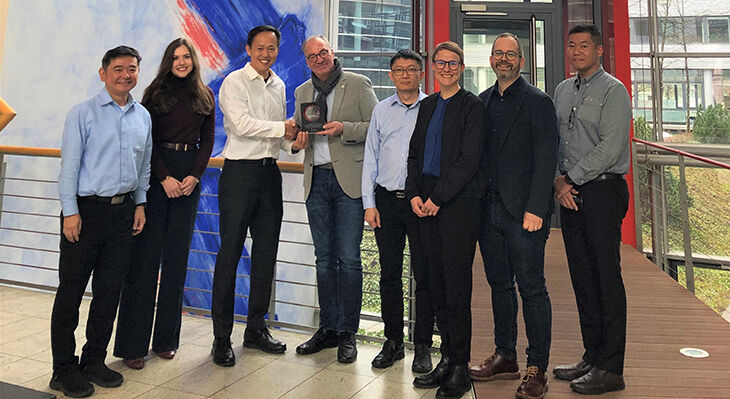Temasek Polytechnic: BILT partner visits BIBB
Addressing the skilled worker shortage, cooperating with industry partners and integrating generative AI in VET – these were the topics of a fruitful discussion between a delegation from Temasek Polytechnic (TP, Singapore) and the “Bridging Innovation and Learning in TVET” (BILT) project team at BIBB.

BIBB’s President, Professor Dr Friedrich Hubert Esser visited Singapore in 2023 as part of the BILT Bridging Asia Conference. The host, Temasek Polytechnic, visited Bonn in March.
The delegation was led by Mr Peter Lam (Director and CEO, TP), Mr Tay Boon Keat (Director of RIE and Partnerships Development as well as Director of Innovation and Entrepreneurship, TP) and Mr Teng Leng (Acting Director of International Relations, TP). Representing BIBB, Mr Michael Wiechert (Deputy Head of Department VET International, BIBB) and the BILT project team welcomed the guests from Singapore.
The meeting on 13 March focused on the following questions concerning both Singapore and Germany that are highly relevant in the context of BILT cooperation.
How can the skilled worker shortage be tackled?
Everyone agreed that recruiting skilled workers from abroad provides only part of the answer for both countries’ ageing societies. Attractive continuing education and training programmes play a central role. How can upskilling and reskilling be organised flexibly and in effective formats for different target groups? How can the right incentives be created for participants and employers? And how can quality be sufficiently assured, especially when public funding is used?
An insight into Singapore's SkillsFuture initiative was interesting in this regard. Citizens aged 21 and over who have completed initial training are granted significant discounts on CVET programmes via state-funded education funds. One feature stands out in particular: as learners get older, their own contribution to the costs becomes smaller. The critical age group of over 40-year-olds is thus specifically targeted.
Singapore’s training providers have seen a significant increase in course participation. Temasek Polytechnic has also seen and responded to a four-fold increase in the number of adults enrolled in lifelong learning offers at their institution over the past five years.
How can cooperation with industry be strengthened?
This “classic” question, which is regularly discussed in exchanges with foreign delegations at BIBB, provided space to address the special role of the chambers and the inter-company training centres (ÜBS) in the German dual training system.
However, it also became clear during the exchange that, beyond questions of funding, companies have a responsibility to help shape initial and continuing VET, especially as part of the digital and green transition. The realities and needs of medium-sized, small and micro businesses must not be overlooked in this context.
Company involvement was also much discussed as part of the interregional BILT expert group on the impact of digitalisation and greening on VET for the tourism and hospitality industry. Temasek Polytechnic was an active member of this expert group not least as the host of the BILT regional conference in June 2023, which focussed on the “dual transition” in the sector.
How is generative AI changing vocational education and training?
The delegation emphasised Temasek Polytechnic’s position as being fundamentally open to the use of AI and that it is proactively testing the benefits for VET.
They see added value in the areas of individualised education and career guidance, mentoring and personalised training offers, as well as in relation to new content for training in professions being especially altered by the use of AI.
For example, Temasek Polytechnic has just set up an AI-supported design lab in which trainees can experiment with the possibilities of generative AI and prepare for jobs involving the use of AI applications.
BILT builds bridges
This exchange represented another milestone in the ongoing BILT partnership with Temasek Polytechnic.
The BMBF-funded BILT project, which is being implemented by BIBB together with UNESCO-UNEVOC, supports policy and peer learning between Europe and the Asia-Pacific region as well as Africa.
With Temasek Polytechnic, BILT has a strong partner at its side to build new international bridges and strengthen existing ones. We are looking forward to this joint endeavour!